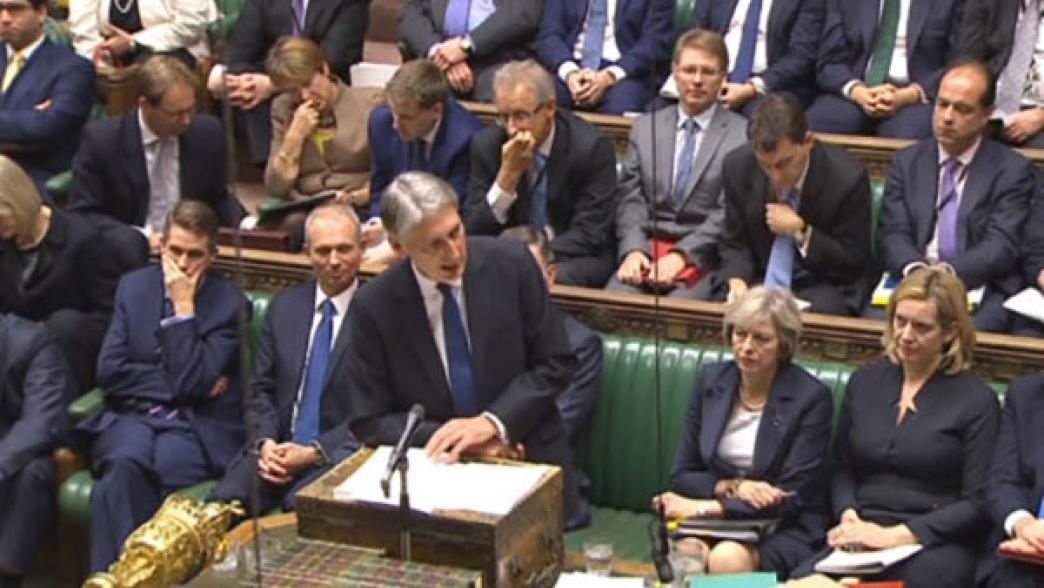The cost of Brexit: what we learned in the Autumn Statement
The Chancellor has announced additional funding to support Whitehall’s preparations for Brexit.

The Chancellor has announced additional funding to support Whitehall’s preparations for Brexit. Robyn Munro looks at what the numbers mean, and if they'll cover the cost of what needs to be done.
What do the numbers mean?
Yesterday the Chancellor announced three sets of spending figures related to Brexit:
- £26m a year by 2019/20 for DIT/FCO, ‘to strengthen trade policy capability’
- Up to £51m next year for DExEU
- Up to £94m a year from 2017-18 ‘until the UK’s exit is complete’
This adds up to £412m for the three ‘Brexit departments’ over the course of this Parliament.
Is it enough?
Neither of the new departments - which have been up and running for over 4 months - have published their budgets. This means we don't know whether this funding is in addition to what they already have or, as seems more likely, is their agreed budget for this year and next. Before we can say with any certainty whether Government has budgeted enough to deliver Brexit, we need more clarity on how much key departments have to spend in coming years.
But taking these figures at face value, we can compare the Chancellor’s allocations to what the Institute predicted would be necessary to prepare Whitehall to deliver Brexit.
Department for Exiting the EU
David Davis has previously said that he expects DExEU eventually to number around 400 staff. Back in October, we estimated that the cost of bringing DExEU up to full strength would be around £40m a year. That figure covers the cost of running the department, including salaries and building costs. It doesn’t include the cost of setting up a new department from scratch, which is in the region of £15m. So the Chancellor’s announcement of £51m for DExEU in 2016-17 is as we would expect – although it’s too early to tell whether 400 staff is the right number of staff required. DExEU will need to retain some flexibility to adapt to the task of delivering Brexit ad the end goal becomes clearer
Department for International Trade
We also looked at how much it would cost to set up and staff the Department for International Trade (DIT). We don’t know what the eventual size of this department will be, but based on the size of comparable Trade departments in the US and New Zealand, we estimated final headcount of around 250 staff. Staffing a department of that size would cost around £25m a year. This is broadly in line with the £26m a year announced yesterday.
However, there are two important caveats to this. Firstly, the Chancellor announced £26m a year by 2019-20 - so annual funding before then may be lower. DIT’s role will be to negotiate new trade agreements, which the UK cannot do until it leaves the EU. It is possible that DIT can do the preparatory work for these deals with fewer staff, at lower cost. But as we have pointed out, trade deals are increasingly complex – the UK will need to do significant scoping work to identify priority deals, bargaining chips and key trade priorities long before negotiations begin. Less investment in the department now may retard this preparatory work.
The second caveat is that this funding is to be shared between DIT and the Foreign and Commonwealth Office (FCO). Sir Simon Fraser, former head of the FCO, has said that a ‘considerable uplift’ in the department’s budget and headcount will be required to deliver Brexit. Sir Simon was referring to the delivery of Brexit across the whole of the FCO’s remit – not just trade policy. But it isn’t clear from the figures announced yesterday how much of the funding announced yesterday will go to the FCO, or how far it will reverse the spending and staff cuts of recent years.
Given the task ahead of DIT and the possible need to boost the FCO, the Chancellor's number could be a little small.
What about the rest of Whitehall?
The task of planning and delivering Brexit cannot be handled by DExEU, DIT and the FCO alone. Other departments are already engaged in preparing for Brexit – whether that’s feeding in data and analysis to inform the Government’s negotiating position, or identifying what EU laws need to be amended or replaced by the Great Repeal Bill. For all departments the task of delivering Brexit comes on top of existing policy commitments and reform programmes. For many, the task of planning and delivering Brexit, on top of existing policy commitments – and against a backdrop of staff cuts – is simply not feasible.
What we didn’t get from the Autumn Statement yesterday was any indication of what additional resource might be made available to these departments. Instead, the Chancellor said that there will be no changes to spending plans, and that in addition to those cuts that have already been allocated he still expects to find a further £3.5bn of efficiency savings by 2020 – though we don’t know where this £3.5bn will come from.
If no additional resource is available, then departments must work within their existing resources to deliver Brexit. We have argued that departments should be able to re-prioritise resource to where it is most needed. But to do this, they need a clear political steer. The Autumn Statement may have delivered some much needed Brexit funding, but what Whitehall is still waiting for is direction from the centre about where it should allocate resource.
- Supporting document
- IfG_Autumn_statement_2016_v5.pdf (PDF, 177.93 KB)
- Topic
- Brexit Public finances
- Political party
- Conservative
- Position
- Chancellor of the exchequer
- Administration
- May government
- Department
- Department for Exiting the European Union Department for International Trade Foreign, Commonwealth and Development Office
- Publisher
- Institute for Government